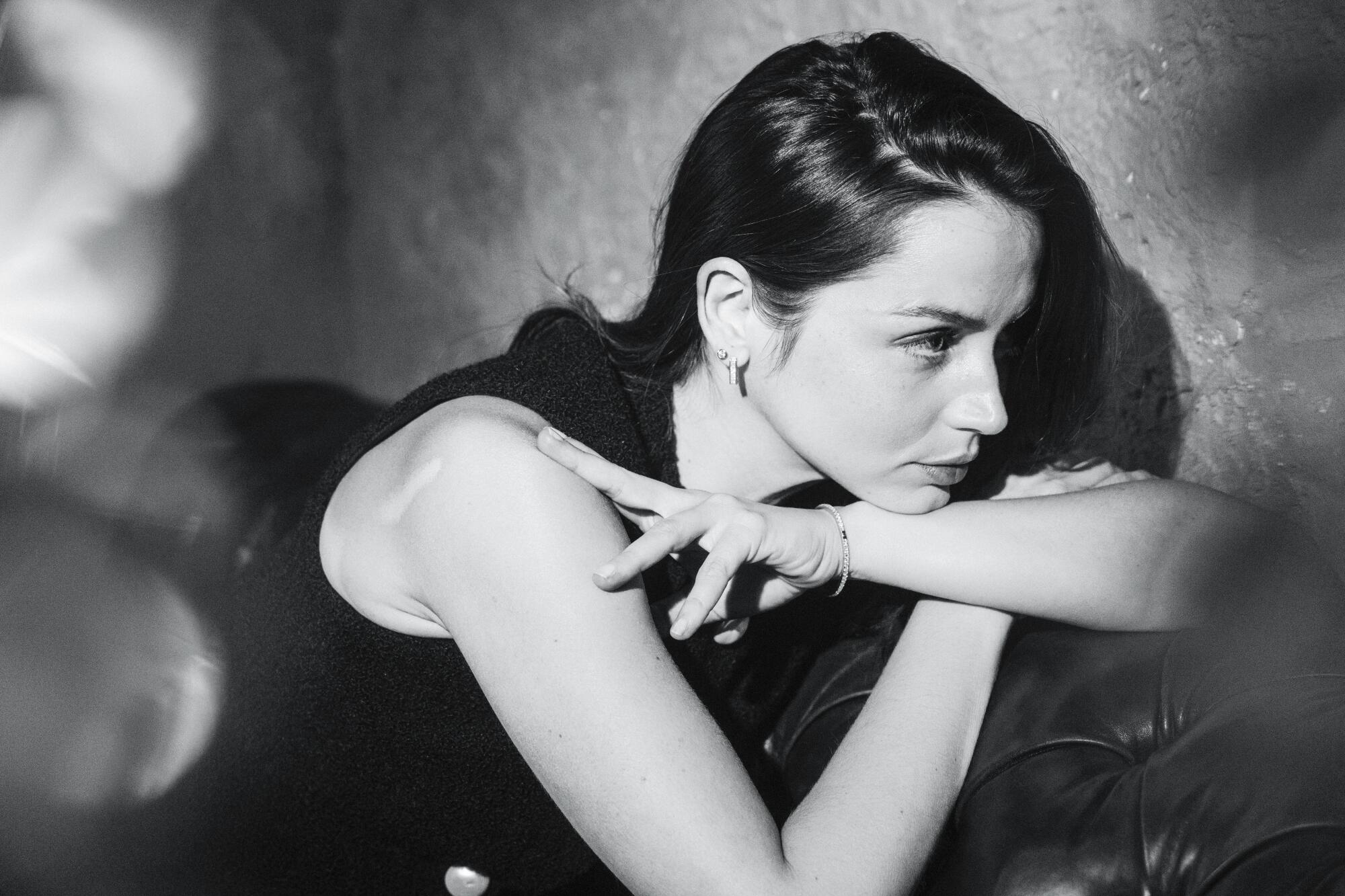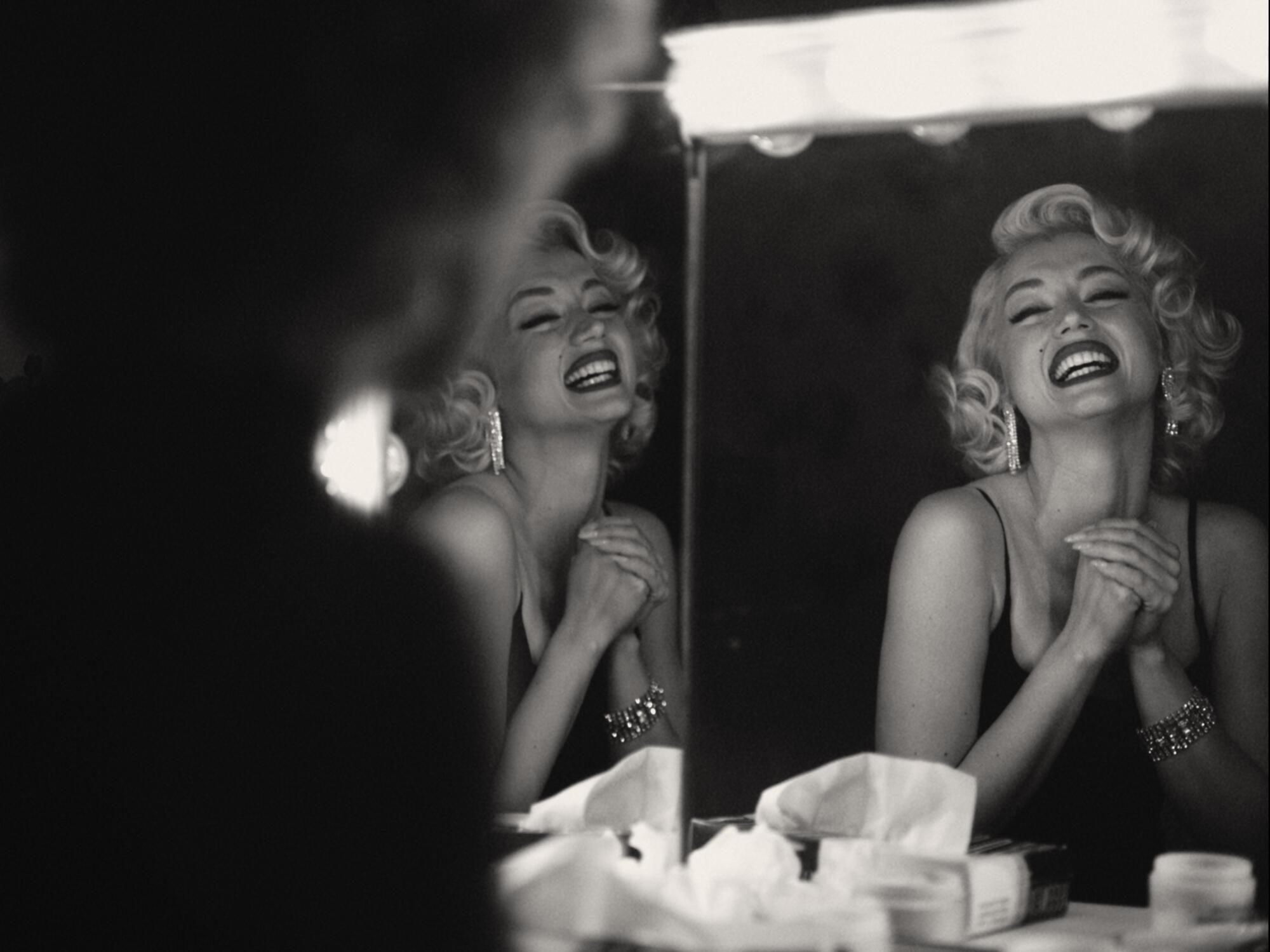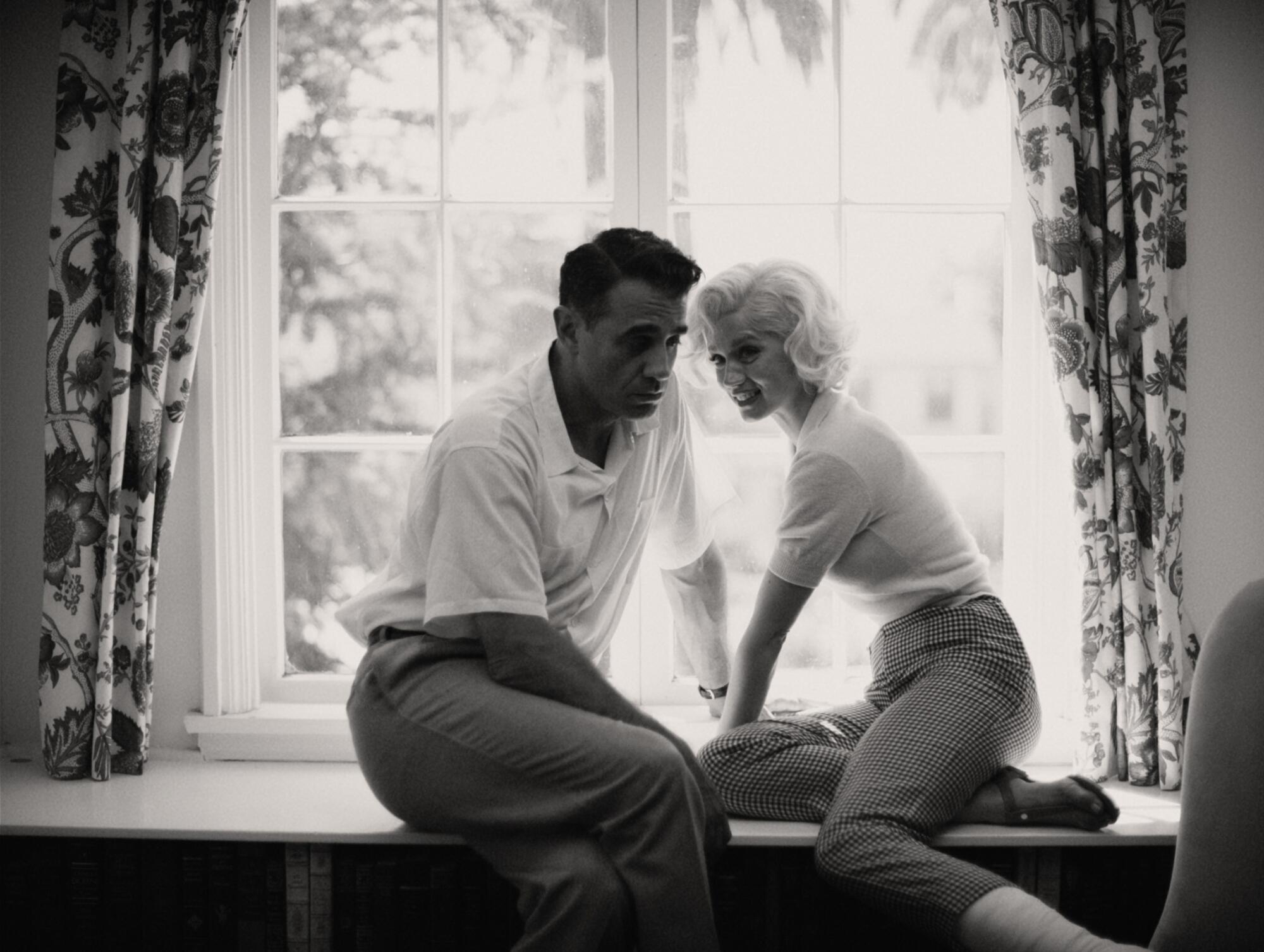
- Share via
The first time Havana-born actor Ana de Armas was told she resembled Marilyn Monroe she was standing in a parking lot, having just been introduced to actor-producer Colleen Camp. “She had an innocence, a sweetness,” Camp remembers of the young De Armas. “I thought she was incandescent. She was very funny naturally, not trying to be funny. And I told her, ‘You know what? You remind me of Marilyn Monroe.’”
Back then, De Armas didn’t know what to think. She’d already starred in a romantic drama, “Una rosa de Francia” in Cuba, then became famous in Spain by appearing for six seasons in a popular teen series, “El Internado (The Boarding School).” But now she was newly arrived in Hollywood, with a very light grasp of the English language, attempting to start her career from scratch.
“At the time, I was like, ‘What is this lady saying?’” says De Armas, speaking via Zoom from a hotel room in Prague. “But she was right. She was the original [to say that].”
The way Camp tells the story, she was so captivated by De Armas that she urged director Eli Roth to meet with her. The rest is erotic psychological horror film history: The De Armas made her U.S. feature film debut as a scantily clad temptress in “Knock Knock,” having learned her dialogue phonetically. Years later, another director, Andrew Dominik, would settle in front of his TV, stumble onto “Knock Knock” and make that same connection between De Armas and the ‘50s era blond bombshell.
For the last 15 years, Dominik had been trying to get a movie made based on Joyce Carol Oates’ bestseller “Blonde,” a fictionalized biography of Monroe, from her turbulent upbringing to her rise to stardom to her tragic demise at age 36. “I was looking for someone where I could see what all the fuss is about,” Dominik writes in an email. “Marilyn Monroe was like the sun onscreen — everything else revolved around her. Ana just has something that compels you to watch her and you can feel her. She was playful, she could turn on a dime and her emotions were like a force field that altered the atmosphere around her. She was powerful.”

Next came the hard work of transforming herself into an instantly recognizable American icon. De Armas devoted a year to working with a dialect coach to absorb Monroe’s breathy delivery and distinctive word pronunciations, and while in the midst of playing a wide-eyed caregiver in Rian Johnson’s 2019 crackling whodunnit “Knives Out,” she perfected the choreography for legendary Monroe numbers such as “Diamonds Are a Girl’s Best Friend” from “Gentlemen Prefer Blondes.”
“The way I approach every part is to really commit,” says De Armas. “I do a part and I do the best I can with the material I have. I give everything I’ve got. My full attention. But some parts require more than the other. In this case, this one required as much precision and work and just for me to be there mentally. I didn’t want to miss a step. Not just in an ambitious way of saying, ‘I have to nail this part.’ It was also for myself.”
Indeed, with a budget of a reported $22 million, “Blonde” was shot, in pre-pandemic 2019, in 47 days, a time frame that required zigzagging all over Los Angeles, filming at more than 22 locations, many where Monroe had actually resided or hung out. “Her apartments, the [1920s bungalow] where she lived with her mother when she was a little girl, and the house where she lived and died,” says De Armas, ticking off meaningful locations. She and Dominik also visited Monroe’s gravesite at Westwood Village Memorial Park. “She’s all over L.A. She’s there. And everyone knows a story.”
Shooting in landmark settings was just one of the things that turned “Blonde” into an immersive experience for De Armas. Dominik often dressed both her dialect coach and boom operator in period clothes so that he could keep rolling between takes, shadowing De Armas so closely that there was scant time to decompress, to feel like Ana for a second. “There was a feeling of a documentary sometimes,” she says. “There were a lot of moments of someone giving me a note or fixing something and you can tell the camera is just going after me, the DP puts his camera on his shoulder and he’s just following me around.”
To her, the intensity during production never seemed anything less than crushing. This, she discovered, wasn’t necessarily a bad thing. “All those moments of hesitation and fear and insecurities were in my favor when I was playing the part,” she says. “Because I, for the most part, felt like that was what [Monroe] was feeling too. All that pressure. The expectancy of always delivering. Giving and giving and giving and just being exhausted. And that, for me, was good. Every time I had time off, my brain was going to self-judgement and doubts and worries. ‘What am I doing?’ Is this good enough?’ ‘What is [everyone around me] thinking?’”

When “Blonde” premiered at the 2022 Venice Film Festival, the film received a 14-minute standing ovation during which tears coursed down De Armas’ cheeks and, for a bit, it all felt worth it. Then came the reviews, many of which praised her commanding performance while stingingly rebuking the movie as an exploitation of Monroe and for its unrelenting bleakness.
Since then, she’s had a crash course in what it’s like to support a film that inspires positive and negative responses, both equally passionate. “There’s no in-between with the movie, I feel like,” the actor says. “Some people just go with it and quickly make the connection. They see the photos, the cinematic language, what we were trying to do with the images and reinterpreting this story. They get it, they love it, and they think Andrew is amazing. And then, there is the other side who really don’t connect with it at all. And even beyond that, they find it offensive. So it’s been expected, but still surprising to witness.”
One thing is for sure: Her duties promoting “Blonde” were such that she’s finally in Prague playing catch-up, learning mixed martial arts such as jiu-jitsu and hand-to-hand combat for “Ballerina,” the John Wick spinoff in which she plays an assassin and which may — or may not — reunite her with “Knock Knock” co-star Keanu Reeves. When asked who else is in the picture, she says, “To be honest, I don’t know [who is in the cast] yet. We’re not filming. We’re in pre-production,” she adds. “But it’s in the same world, so I expect some of the actors from ‘John Wick’ to come back.”
Was she being kept in the dark, or has “Blonde” taught her to parse her words very carefully? Either way, De Armas says she’s a different actor post-“Blonde.”
“It changed the way I thought about my limitations, and the way I understand challenges,” she says. “It changed the way I work with the director. The collaboration. [Andrew] changed the way I expect future experiences to be like. That, for me, is a very high bar.”
More to Read
From the Oscars to the Emmys.
Get the Envelope newsletter for exclusive awards season coverage, behind-the-scenes stories from the Envelope podcast and columnist Glenn Whipp’s must-read analysis.
You may occasionally receive promotional content from the Los Angeles Times.







